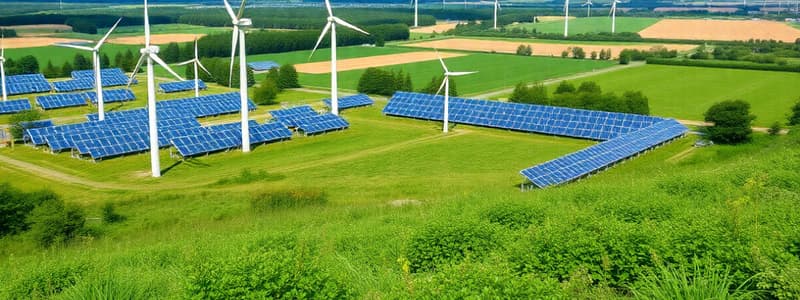Podcast
Questions and Answers
Which objective of energy regulation faces the most significant challenge when attempting to balance consumer costs with the need for infrastructure development?
Which objective of energy regulation faces the most significant challenge when attempting to balance consumer costs with the need for infrastructure development?
- Protecting consumers from unfair practices.
- Ensuring reliable energy supplies. (correct)
- Encouraging energy efficiency and conservation.
- Promoting competitive energy markets.
An energy company is proposing a new natural gas pipeline that will cross several ecologically sensitive areas. Which type of regulation would primarily govern the environmental impact assessment and mitigation measures for this project?
An energy company is proposing a new natural gas pipeline that will cross several ecologically sensitive areas. Which type of regulation would primarily govern the environmental impact assessment and mitigation measures for this project?
- Economic Regulation
- Environmental Regulation (correct)
- Market Regulation
- Safety Regulation
A state legislature is considering a bill to offer tax credits for homeowners who install solar panels. Under which area of energy law would this initiative fall?
A state legislature is considering a bill to offer tax credits for homeowners who install solar panels. Under which area of energy law would this initiative fall?
- Nuclear Energy Law
- Renewable Energy Law (correct)
- Electricity Law
- Oil and Gas Law
In international energy trade agreements, which aspect is MOST directly aimed at mitigating global climate change?
In international energy trade agreements, which aspect is MOST directly aimed at mitigating global climate change?
Which of the following scenarios would MOST likely trigger economic regulation in the energy sector?
Which of the following scenarios would MOST likely trigger economic regulation in the energy sector?
What is the primary role of governmental agencies, such as the Federal Energy Regulatory Commission (FERC), in energy regulation?
What is the primary role of governmental agencies, such as the Federal Energy Regulatory Commission (FERC), in energy regulation?
Which aspect of energy regulation is MOST directly influenced by rapid advancements in smart grid and energy storage technologies?
Which aspect of energy regulation is MOST directly influenced by rapid advancements in smart grid and energy storage technologies?
When an energy project requires land acquisition that involves displacing local communities, which legal aspect becomes MOST critical?
When an energy project requires land acquisition that involves displacing local communities, which legal aspect becomes MOST critical?
An aging nuclear power plant seeks license renewal, prompting concerns about safety and waste disposal. Which area of energy law takes precedence in this situation?
An aging nuclear power plant seeks license renewal, prompting concerns about safety and waste disposal. Which area of energy law takes precedence in this situation?
A new regulation is introduced that mandates all new residential buildings must source a percentage of their energy from renewable sources. Which objective of energy regulation is MOST directly supported by this regulation?
A new regulation is introduced that mandates all new residential buildings must source a percentage of their energy from renewable sources. Which objective of energy regulation is MOST directly supported by this regulation?
Flashcards
Energy Law
Energy Law
Legal rules related to energy production, distribution, and consumption, covering regulations, treaties, legislation, and jurisprudence.
Regulatory Frameworks for Energy Industries
Regulatory Frameworks for Energy Industries
Frameworks that set rules for energy production, transmission, and distribution, ensuring fair competition and consumer protection.
Renewable Energy Incentives Laws
Renewable Energy Incentives Laws
Laws that encourage the use of sustainable energy sources through tax credits, subsidies, and feed-in tariffs.
Environmental Regulations for Energy Projects
Environmental Regulations for Energy Projects
Signup and view all the flashcards
International Treaties (Energy)
International Treaties (Energy)
Signup and view all the flashcards
Legal aspects of Energy Infrastructure Development
Legal aspects of Energy Infrastructure Development
Signup and view all the flashcards
Energy Regulation
Energy Regulation
Signup and view all the flashcards
Regulatory Bodies (Energy)
Regulatory Bodies (Energy)
Signup and view all the flashcards
Economic Regulation (Energy)
Economic Regulation (Energy)
Signup and view all the flashcards
Environmental Regulation (Energy)
Environmental Regulation (Energy)
Signup and view all the flashcards
Study Notes
- Energy law encompasses the legal rules related to energy production, distribution, and consumption
- It covers a wide array of issues, including regulations, treaties, legislation, and jurisprudence
Scope of Energy Law
- Energy law governs diverse areas such as fossil fuels, renewable energy sources, and nuclear energy
- It addresses environmental impacts, energy efficiency, and market regulation
- It includes laws concerning energy exploration, production, transportation, and use
Key Areas
- Regulatory frameworks for energy industries
- Laws governing renewable energy incentives
- Environmental regulations for energy projects
- International treaties related to energy trade and climate change
- Legal aspects of energy infrastructure development
Regulatory Frameworks for Energy Industries
- These frameworks set the rules for energy production, transmission, and distribution
- They control market entry, pricing, and service quality
- Regulations ensure fair competition and protect consumers
- Oversight is often provided by governmental agencies
Laws Governing Renewable Energy Incentives
- Renewable energy laws promote the development and use of sustainable energy sources
- Incentives include tax credits, subsidies, and feed-in tariffs
- These laws aim to reduce reliance on fossil fuels and mitigate climate change
- They encourage investments in renewable energy technologies
Environmental Regulations for Energy Projects
- Environmental regulations minimize the adverse impacts of energy production
- These regulations cover air and water pollution, waste disposal, and land use
- Environmental impact assessments are often required for energy projects
- Regulations ensure energy projects adhere to environmental standards
International Treaties Related to Energy Trade and Climate Change
- International treaties govern cross-border energy trade and cooperation
- They address climate change through emissions reduction targets and carbon trading
- Treaties promote energy security and sustainable development
- These agreements foster international collaboration on energy issues
Legal Aspects of Energy Infrastructure Development
- Laws govern the planning, construction, and operation of energy infrastructure
- This includes pipelines, power plants, and transmission lines
- Regulations address land acquisition, environmental protection, and safety
- Legal frameworks ensure the reliable and safe operation of energy facilities
Subtopics in Energy Law
- Oil and Gas Law: Focuses on the exploration, production, and transportation of oil and natural gas
- Electricity Law: Covers the generation, transmission, and distribution of electricity
- Renewable Energy Law: Pertains to the development and use of renewable energy sources
- Nuclear Energy Law: Governs the operation and safety of nuclear power plants
Oil and Gas Law
- Governs the leasing of mineral rights, drilling operations, and pipeline regulations
- Addresses environmental concerns related to oil spills and methane emissions
- Focuses on international trade and transportation of oil and gas
Electricity Law
- Regulates electricity markets, grid operations, and consumer protection
- Deals with issues such as electricity pricing, reliability, and renewable energy integration
- Addresses the development of smart grids and energy storage technologies
Renewable Energy Law
- Supports the deployment of solar, wind, hydro, and biomass energy
- Includes incentive programs like feed-in tariffs, tax credits, and renewable energy certificates
- Focuses on grid access and integration for renewable energy projects
Nuclear Energy Law
- Ensures the safe operation of nuclear power plants and the disposal of nuclear waste
- Addresses issues related to nuclear non-proliferation and security
- Includes regulations for nuclear liability and insurance
Energy Regulation
- Energy regulation involves government oversight of the energy sector
- It aims to ensure reliable, affordable, and sustainable energy supplies
- Regulation covers pricing, market behavior, and environmental protection
Objectives of Energy Regulation
- Ensuring reliable energy supplies
- Promoting competitive energy markets
- Protecting consumers from unfair practices
- Encouraging energy efficiency and conservation
- Reducing environmental impacts of energy production
- Supporting the development of renewable energy sources
Regulatory Bodies
- Governmental agencies responsible for overseeing the energy sector
- They set regulations, issue licenses, and enforce compliance
- Examples include the Federal Energy Regulatory Commission (FERC) in the United States and the Energy Regulatory Office (ERO) in various countries
Key Regulatory Functions
- Setting and enforcing energy standards
- Monitoring energy markets
- Approving energy infrastructure projects
- Resolving disputes among energy companies
- Promoting energy efficiency and conservation
- Ensuring fair access to energy infrastructure
Types of Energy Regulation
- Economic Regulation: Controls prices, market entry, and service standards
- Environmental Regulation: Addresses pollution and other environmental impacts
- Safety Regulation: Ensures the safe operation of energy facilities
Economic Regulation
- Aims to prevent monopolies and promote competition
- Controls prices to protect consumers from excessive rates
- Ensures fair access to energy infrastructure
- Regulates market behavior to prevent manipulation
Environmental Regulation
- Minimizes the environmental impacts of energy production and use
- Sets standards for air and water quality
- Regulates waste disposal and land use
- Requires environmental impact assessments for energy projects
Safety Regulation
- Ensures the safe operation of energy facilities
- Sets standards for construction, maintenance, and emergency response
- Regulates the transportation of hazardous materials
- Conducts inspections and enforces compliance
Challenges in Energy Regulation
- Balancing competing interests of stakeholders
- Adapting to technological changes
- Addressing climate change
- Ensuring grid reliability
- Promoting energy affordability
- Navigating complex legal and political landscapes
Balancing Stakeholder Interests
- Energy regulation affects various stakeholders, including consumers, producers, and the environment
- Balancing their interests requires careful consideration of economic, social, and environmental factors
- Regulatory decisions must address competing priorities and trade-offs
Adapting to Technological Changes
- The energy sector is rapidly evolving due to technological innovations
- Regulation must adapt to emerging technologies such as renewable energy, smart grids, and energy storage
- Regulatory frameworks must be flexible and forward-looking
Addressing Climate Change
- Energy regulation plays a critical role in mitigating climate change
- It supports the transition to low-carbon energy sources
- It promotes energy efficiency and conservation
- It regulates greenhouse gas emissions
Ensuring Grid Reliability
- Energy regulation ensures the reliability of the electricity grid
- It sets standards for grid operations and maintenance
- It promotes investment in grid infrastructure
- It addresses challenges posed by renewable energy integration
Promoting Energy Affordability
- Energy regulation balances the need for reliable energy supplies with the goal of affordability
- It controls prices to protect low-income consumers
- It promotes energy efficiency to reduce energy bills
- It supports programs that assist vulnerable populations
Navigating Complex Legal and Political Landscapes
- Energy regulation involves complex legal and political issues
- It requires expertise in law, economics, and engineering
- It involves navigating conflicting interests and political pressures
- It requires collaboration among various government agencies and stakeholders
Studying That Suits You
Use AI to generate personalized quizzes and flashcards to suit your learning preferences.





